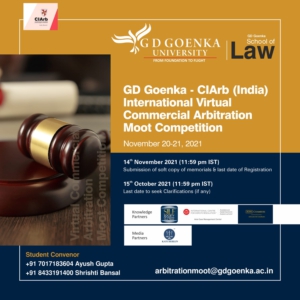Views
Nothing Found
Sorry, no posts matched your criteria
News
GD Goenka – CIArb (India) International Virtual Commercial Arbitration Moot Court Competition, 2021

GD Goenka University, Gurugram is part of the GD Goenka Group. GD Goenka University was established in 2013 under the Haryana Private Universities (Amendment) Act, 2013. The GD Goenka University School of Law offers Law Degree Programs at Undergraduate, Post Graduate and Doctoral levels and strives to open new vistas in the arena of law through clinical legal studies and research. With an objective to raise the standards of clinical legal education in India, the GD Goenka University, School of Law regularly hosts Moot Court Competitions and encourages law students from various Law Schools and Universities from across India and world to learn the art and skills of advocacy.
In November 2020, School of law, GD Goenka University successfully organized an arbitration moot court competition “GD Goenka – CIArb (India) International Virtual Commercial Arbitration Competition 2020” in association with CIArb (India) Chapter. The University is now organising the Fifth edition of “GD Goenka – CIArb (India) International Virtual Commercial Arbitration Competition 2021″ in association with CIArb (India) Chapter on 20th-21st November. The event is expected to have participation from various Law Schools and Universities from across India & abroad.
The Registration for the Competition is open. The registration fee is USD 11 /- only.
You would also be pleased to know the Prizes for winners in various categories-
Winners- Rs 70,000/- (USD 935/-)
Runners Up- Rs 40,000/- (USD 534/-)
Best Speaker Male & Female- Rs 10,000/- each. (USD 133/- each)
Best Memorial- Rs 10,000/- (USD 133/-)
The link to the registration form, posters and brochure is found below.
Registration Form- https://forms.gle/ZwJpZKmsPNDJiwMN6
With Warm Regards,
Prof. (Dr.) Tabrez Ahmad,
Vice Chancellor GD Goenka University &
Dean School of Law
EAF Call for Papers: The Emerging New Landscape of European Restructuring and Insolvency
The INSOL Europe Academic Forum (IEAF) is inviting submission for its 17th annual conference, taking place from 2-3 March 2022 in Dublin (Ireland). Expressions of interest are invited for the delivery of research papers within the overall academic conference’s theme: “The Emerging New Landscape of European Restructuring and Insolvency”
The theme is intended to focus on, inter alia, the following overall topics:
- Reflections on the 2019/1023 Directive as such, and on further harmonization of insolvency laws in the EU;
- Reports on national implementations of the 2019/1023 Directive in the EU Member States, including related changes to insolvency and company laws;
- Cross-border issues relating to the new restructuring frameworks;
- The longer-term impacts of the COVID-19 pandemic on insolvency and restructuring laws in the EU and elsewhere;
- Digital assets and data in the context of insolvency proceedings and the new restructuring frameworks.
Conference methodology
In line with practice established in our past academic conferences, the intention for this year’s conference is to have research papers that challenge existing approaches, stimulate debate and ask, and attempt to answer, comparative and interdisciplinary questions about the above-mentioned topics. Accordingly, proposals are invited that do more than just outline a topic of interest in respect of any given jurisdiction, but seek to understand, analyse and critique the fundamentals of insolvency and restructuring systems in ways that are relevant across jurisdictions and across fields of academic inquiry. All contributions must be in English.
Presenting at the IEAF conference
Expressions of interest in delivering papers within the conference theme should be sent by email on or before 6 December 2021 to the INSOL Europe Academic Forum’s Secretary. Authors of papers selected for presentation will benefit from a waiver of the participation fee for the academic conference, however, they will be responsible for their own travel and accommodation costs. A limited number of travel grants will be available to junior scholars invited to present.
For further information, see: www.insol-europe.org/academic-forum-events
Tulane/ACTEC Symposium on Conflict of Laws in Trusts and Estates
Tulane University School of Law and The American College of Trust and Estate Counsel’s Legal Education Committee are organizing the 9th academic symposium financially supported by The ACTEC Foundation. The symposium, Conflict of Laws in Trusts and Estates will be held at the Tulane University School of Law on Friday, October 21, 2022. The keynote address will be given by Professor Jeffrey Schoenblum of Vanderbilt University Law School.
Among the objectives of this symposium are the following:
- To bring together prominent and up-and-coming scholars for the discussion of important issues in conflict of laws;
- To spur leading-edge research on conflict of laws in trusts and estates;
- To encourage professors of trusts and estates to incorporate and consider issues of conflict of laws in their scholarship and teaching;
- To promote collaborations and exchanges between conflict-of-laws scholars and scholars of trusts and estates.
Papers presented at the symposium will consist of papers selected from this Call for Papers and papers from invited speakers. The papers will be published in the Tulane Law Review.
If you would like to be considered to present a paper, please submit an abstract of your paper to Ron Scalise by email (rscalise@tulane.edu) by November 1, 2021. Those chosen to participate in the symposium will be notified no later than December 1, 2021. Symposium speakers will be required to submit a draft of their papers by August 15, 2022, so that the panel commentators will have sufficient time to prepare their commentary.
Symposium speakers will be reimbursed for their travel expenses (economy airfare, the cost of ground transportation, and up to two nights’ hotel stay). Speakers will be invited to dinner on the evenings of Thursday, October 20, 2022, and (for speakers staying Friday evening) Friday, October 21, 2022.
Breakfast and lunch will be provided to speakers and attendees on Friday, October 21, 2022, courtesy of The ACTEC Foundation.
Questions about the symposium or this call for papers should be directed to Ron Scalise at the email address above.
This symposium was made possible through the financial support of The ACTEC Foundation, https://actecfoundation.org.


